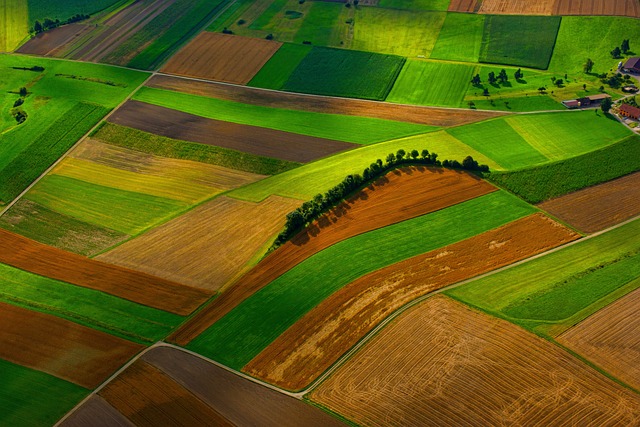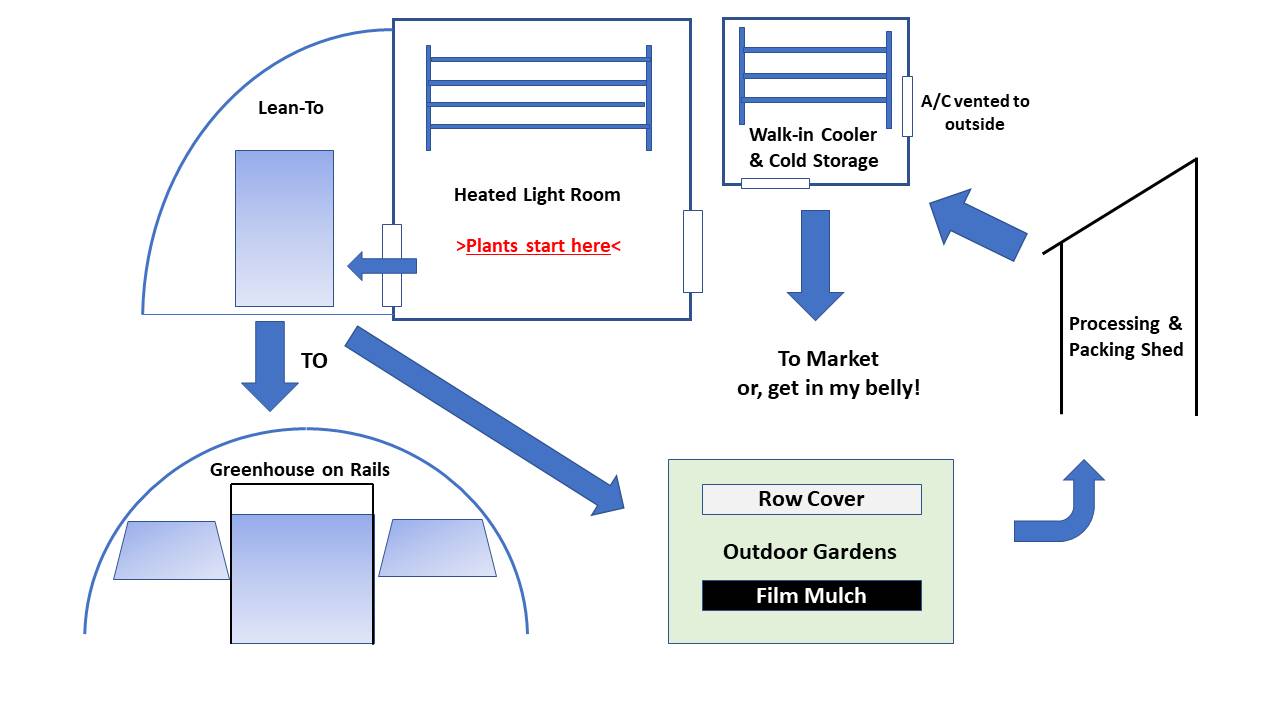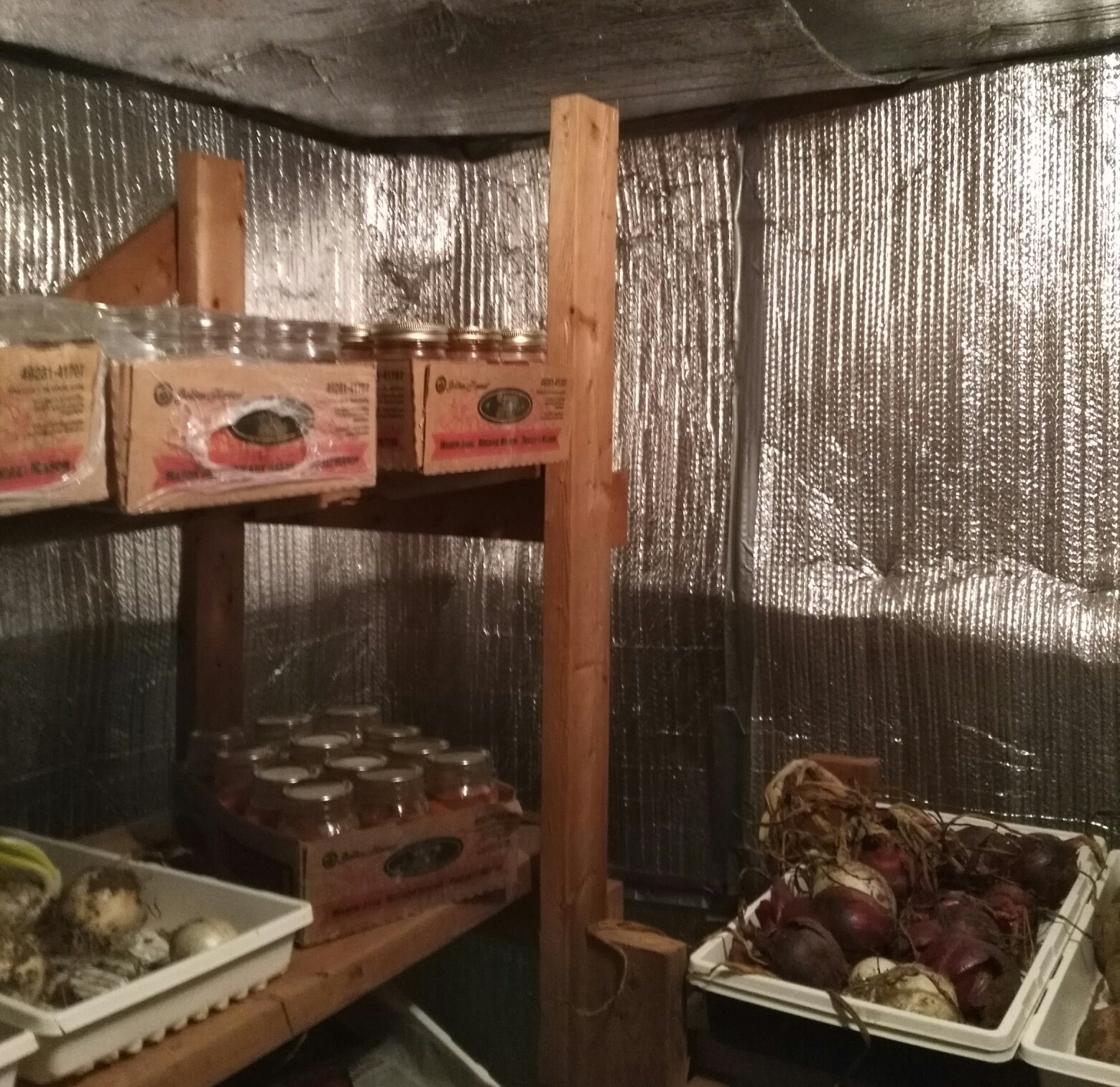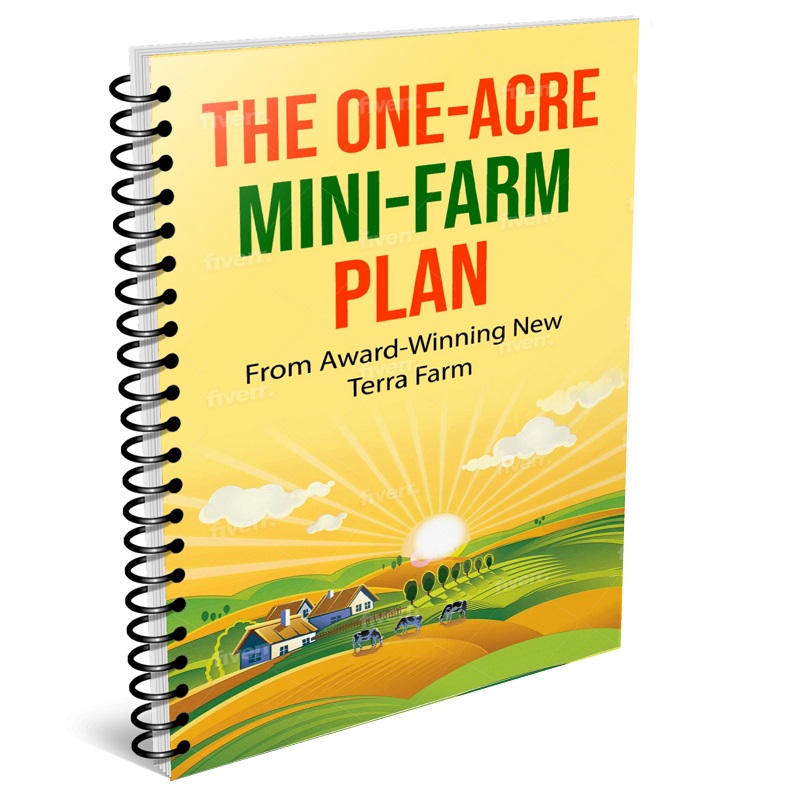Your Small Farm Survival Plan
 Do you have a survival plan for your small farm? Do you have a survival plan for your small farm?Seems like there's lots of bad news on the horizon these days e.g. political fumbling, economic failures, endless simmering wars, and Peak Pretty-Much-Everything. Makes me pretty happy to be on my farm, where at least I can try to prepare for whatever comes. In that vein, here's a few ideas for a small farm survival plan to help you figure out your priorities for the near future. Job # 1 – Feed yourself. I have neighbours with farms that still buy most of their food at the supermarket. I even have farmers who subscribe to my CSA. I think the number one job for any current or would-be small farmer is to grow as much of your own diet as possible. At least start with this survival garden plan. For the last couple of years, we've also been planting more perennial crops e.g. - fruit trees, nut trees, asparagus - here at New Terra Farm, trying some non-traditional livestock like honey bees, and in general trying to extend the range and variety of food items we produce. This is pretty much the only way to assure a better diet for your family. I see way too little attention paid to this critical element of a long-term farm survival plan. Stored food and stockpiled ammo are necessary but not sufficient; you've got to be able to grow more of your diet. These new crops can also become barter items or new profit centres for your farm. The best way to test the viability of small farm ideas for commercial purposes is to grow it for yourself first. That way customers aren't depending on your learning curve. I also applied this principle when I decided to grow some bedding plants. Because I already had experience growing our own transplants, and I wasn't 'betting the farm' by starting out too large, this has become a successful sideline business. I have a system... The greenhouse to garden to cold storage flow is key to our farm survival plan The greenhouse to garden to cold storage flow is key to our farm survival planThe graphic above is from my Bootstrap Greenhouse book; it depicts how we manage our food supply 12 months of the year. We start plants under lights in our heated and ventilated light room. When mature enough, we move them to one of the greenhouses, or into the garden. Earliest plantings are protected by row cover. When we harvest, we bring the veggies to a processing area to clean and pack. Then to our cold storage room, or to our customers.  Cold storage full of farm goodies Cold storage full of farm goodiesFree One-Acre Farm Plan Get my FREE One-Acre Farm Plan and learn how to raise pigs, chickens and more, integrated with an organic market garden, to
make more money from your small property. Enter your best email and the free report will be sent to you right away Priority # 1 – Water. I think this year in North America has brought home the absolute critical need to assure a water supply. Your long-term small farm survival plan needs to include at least two back-up ways to get water for yourself, your crops and your livestock. Besides my well, I have a 4000-gallon cistern that's fed by rainwater off my barn roof; a natural spring that reportedly has never run dry in the last 40 years (I'm in the process of developing it to make access easier); and immediate storage of two weeks worth of potable water for me and my animals. I also have a good quality ceramic water filter with a capacity of about 15 gallons a day, for personal use. You may not be lucky enough to have a spring, but you can take other steps to assure your water supply. Your farm survival plan has no higher priority.
While I do believe the world will be a scarier, poorer place in the years to come, and there may well be a 'die-off' of the unprepared, I don't think the odds favor a 'Mad Max'/Tina Turner – style complete disruption of all civil society. And I believe you will survive best if you help some of your community to survive as well. Start by finding out who among your friends seems to have a clue about the coming upheavals. Seek ways you can work together to better everyone's chance for survival. You don't have to give away all your secrets, but opening up a little to find some areas of cooperation is a good idea. Right now I barter some of my eggs for baked goods, I've traded vegetables for hay, I bartered a patio door for the hoops for my greenhouse, and in the fall I'll be swapping one of my hogs for a quarter of beef. I've helped friends out on construction projects, and tree planting, and a number of other tasks; they have done the same for me. We borrow tools and equipment from one another – don't buy or rent a seldom-used tool if you can borrow. I visit other local farms regularly to swap ideas and look for opportunities to cooperate. If I can't grow, make, or barter for it, I try to buy it from within my local community. I also have two other farms lined up as 'fall-back' locations if necessary (and I'm theirs). In short, my farm survival plan includes creating a network of folks I can count on in a crunch. I know where to find feed grain locally among my neighbours, where I could buy or barter dairy goats, laying hens, weaner pigs or lambs from, and a host of other necessities for my farm survival plan. More importantly, I know how to raise them, milk them, or kill and cut and wrap them as required. I don't need to do all that TODAY, but acquiring the skills is a good idea. p.s. it's well-known among the people that need to know around here (some low-lifes in every community, I suppose) that I got a long gun and a short temper. Guns and ammo are another topic entirely, use your own judgement on this. More like Farm Survival PlanThe premise behind growing a survival garden is that Business As Usual (BAU) will not continue as usual much longer, and that things like jobs, money, and government services will be in increasingly short supply over the coming years. Growing sweet potatoes can be an important part of your food plan. And despite the fact that Ipomoea batatas is very susceptible to cold, you can grow them even in my chilly 45N latitude. Let’s talk about the why, what, how, and how much of growing sweet potatoes in a cold climate. Achieving food self sufficiency, whether at an individual, community, or national level does not happen by accident. It comes about as a result of planning. The whole world eats petrochemicals, and at an increasing rate. Let me explain that statement, and also what may happen when the availability of cheap oil is curtailed. In most places in North America the 'eating season' is usually longer than the growing season; certainly this is true in my neck of the woods, near Ottawa Ontario latitude 45 north, zone 5. So, what's a survival gardener to do? Answer – plan a four season garden based on seasonal growing, storage and a small greenhouse. You may have recently observed the fragility of the world-wide supply chain courtesy of Corona-chan. A country literally on the other side of the world comes down with the flu, and the impact is felt world-wide. That's why I say the future of food is personal. Every activity of any consequence needs to start with planning; the first step in planning is setting the objective. In planning a survival garden the objective is to provide enough food for subsistence eating, on an on-going basis. I'm taking a little bit of a detour in this installment of my of 'survival' series, to talk about how I found out about an example of a very successful, low tech survival community
More Self-Sufficiency Resources
Chapter 9 - Homestead Gardening: The Self-Sufficient Backyard Raise chickens, pigs and a productive organic garden: The Homesteader Book Bundle If you can find 50 sq ft, you can have fresh egg for breakfast (and maybe barter): The Eggs Factory If you need to build it on your homestead, the plans are here: 16,000 Woodworking Plans
|
See Something You Like? Share!
Got a Great Tip (or a Question) About Survival Gardens?
Got some ideas, questions, suggestions, comments about raising food in a 'have-to' situation? Got an example of a great survival garden, maybe with pictures? Share it here.
Recent Articles
-
1 Acre Farm Ideas: Profitable Micro-Niche Farming That Works
Feb 18, 26 08:56 AM
Discover proven 1 acre farm ideas that actually make money. Learn how to find micro-niches, set prices, and build a profitable small farm business fast. -
New Terra Farm market gardening book shows you success step-by-step
Feb 17, 26 05:10 AM
Start-up, market and manage a successful organic market garden with my Bootstrap Market Gardening Book -
Farm training for the new or wannabe farmer
Jan 02, 26 10:38 AM
Practical farm training from award-winning New Terra Farm



